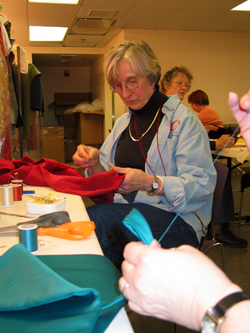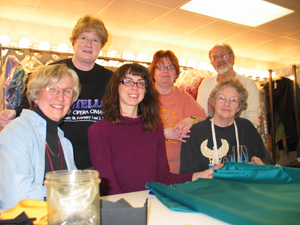 Ninety brilliantly colored costumes rest on a rack and await opening night.
Ninety brilliantly colored costumes rest on a rack and await opening night.
Before the curtain rises, Annika Weber and a team of volunteer seamstresses spend hundreds of hours hemming, mending, fitting, altering and adjusting each costume.
This night, she trims armholes and shortens a crimson tunic for the upcoming production of Verdi’s Aida — an Ethiopian princess who is torn between love of her homeland, family and the man who loves her.
For the past 22 years, Weber, a researcher in UNMC’s Pathology and Microbiology department, has hemmed and fitted thousands of costumes for Opera Omaha productions from Lucia di Lammermoor (her favorite) to Madama Butterfly to Tosca.
 |
UNMC researcher Annika Weber alters a costume for the opera, Aida, which will open a five-show string of performances at the Orpheum Theater on Friday night. Weber volunteers to alter costumes for Opera Omaha in her spare time. |
It’s a week before the curtain rises on Aida and fairly quiet backstage. But, downstairs, Weber and four others on the costume crew busily finalize alterations to the rack of costumes inside the Orpheum’s wardrobe room.
At times, the work seems daunting, Weber said, but it also satisfies and is comparable, she said, to experiments that may take days to plan and complete.
“But, when the results are a ‘ Eureka’ you forget about the effort it took to get there,” she said.
Weber, whose father was in the textile business, learned to sew at an early age, a skill that came in handy in graduate school and when her children were young.
Weber joined UNMC in 1978 and found her dream volunteer job thanks to Dick Serpan, formerly of UNMC and now a purchasing agent for The Nebraska Medical Center. Serpan has been on the wig and makeup crew since 1981. Before that, he spent three years doing props and 10 years as an usher.
“I told Dick I sewed and he got me down here to visit,” Weber said. “That was 22 years ago.”
Costumes arrive at the Opera’s warehouse two to three weeks before a show opens and create a flurry of activity for the costume crew.
During 15-minute fittings — which can lead to second and third fittings — a list of alterations is recorded on a card and attached to the costume.
|
Weber worked 33 hours on costumes for the recent adaptation of Bizet’s Carmen, which, because of the physical nature of the performance, included changing the stuffing in the knee pads worn under the costumes.
“The sewing has to be functional — it doesn’t always have to be pretty,” Weber said. “It has to hold up to the rigors of a production.”
But, night after night, the alteration lists shorten. By the time, Aida steps on stage, the costume crew will have: dyed black boots red, hemmed all 90 costumes with the simplest and fastest stitch, resolved headdress issues and altered arm holes so particular garments hang straight.
Weber or a colleague will be “on hand” during each production in case emergency repairs arise.
“Pants will split, hems will rip, things just fall apart sometimes,” Weber said. “We’ll rush up to stage with a needle and thread to fix it.”
A fan of opera, Weber attends one performance of each season’s productions.
 |
Front row from left — Annika Weber, Cheri Sanwick, Julie Parker — back row from left — Sally Jo Holm, Dolores Gruber and Tom Burton, president of the Craftsman’s Guild. |
After a production, Weber helps the team dismantle and pack the garments for shipment to the next destination, whether it’s the opera’s warehouse, the launderer or a future production site.
Opera Omaha reaps thousands of dollars in volunteer services thanks to people like Weber, who is a member of the Craftsman’s Guild. Weber, too, benefits from the off-the-clock hours.
“It is extremely stimulating doing something so different,” she said. “Plus, I enjoy opera, the comradery of the people working there and doing something for the community.”